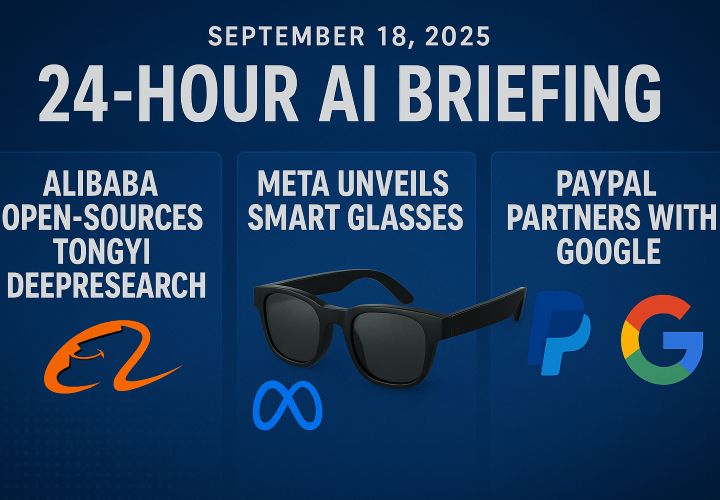AI Navigation
- articleAI Trends
- lightbulb_2AI Tips
- assistant_navigationAI Navigation
- heatHot Articles
- emergency_heat_2Hot Tips
- format_list_numberedPrompt Formatter
- psychologyTest Center(RPI)
September 18, 2025 · 24-Hour AI Briefing: Alibaba Open-Sources Tongyi DeepResearch, Meta Unveils Smart Glasses, PayPal Partners with Google
In the past 24 hours, the AI and tech landscape has seen several major developments. From Alibaba open-sourcing its Tongyi DeepResearch model, to Meta showcasing a lineup of smart glasses at Meta Connect, to PayPal teaming up with Google for online shopping innovation—these moves highlight how tech giants are reshaping both technology and business ecosystems.

Alibaba Open-Sources Tongyi DeepResearch
Alibaba has officially open-sourced Tongyi DeepResearch, a model that outperformed OpenAI’s Deep Research and DeepSeek-V3.1 across multiple authoritative benchmarks. Users can now download it on GitHub. During inference, the Tongyi team designed two modes: ReAct, for accurately evaluating the model’s core reasoning abilities, and IterResearch Heavy, based on a test-time scaling strategy, which pushes the model to its performance limits.
Analysis: This once again demonstrates Alibaba’s leading position in large model research. The dual-mode design—ReAct and IterResearch—shows both technical depth and engineering flexibility. By open-sourcing such a high-performing agent model, Alibaba has made a significant contribution to the global AI community.
Meta Showcases New Smart Glasses
At the Meta Connect conference, Meta unveiled multiple new smart glasses. The highlight was its first consumer-grade Ray-Ban smart glasses with a built-in display, priced at $799 and available starting September 30. The right lens features a small digital screen for basic notifications, and the device can be controlled via a wristband with gesture support.
Meta also launched Oakley’s Vanguard glasses, priced at $499, aimed at athletes. This model integrates platforms like Garmin and Strava to provide real-time training data and post-workout summaries, with a battery life of up to 9 hours. Vanguard will be available starting October 21.
Analysis: The $799 Ray-Ban display glasses represent Meta’s first serious push into the consumer AR space, while the $499 Oakley Vanguard shows a strategic move into vertical niches like sports. Compared with Apple’s ultra-premium Vision Pro, Meta’s lightweight and affordable approach feels more grounded and could grab market share. To date, Ray-Ban smart glasses have already sold over 2 million units. For Meta to expand further, it will need additional innovation to keep attracting users.
PayPal Partners with Google on Online Shopping
PayPal has announced a partnership with Google to integrate digital payments with AI-powered tools across global e-commerce. As part of this collaboration, multiple Google-branded products will feature PayPal checkout, while a new “AI agent” framework will streamline the process from order to payment. This will allow sellers to showcase products more intelligently and optimize conversion.
Analysis: This partnership brings together two industry leaders with complementary strengths. PayPal contributes its massive payment infrastructure and global user base, while Google brings advanced AI and data analytics. Combining payments with AI-driven insights promises smoother, more personalized shopping experiences and a more efficient sales channel for merchants. It also signals PayPal’s attempt at reinvigoration and Google’s growing ambitions in AI-driven commerce.
For more cutting-edge AI updates, business insights, and tech trends, follow:
iaiseek AI Trends
Want to know what else happened in the AI world over the past 72 hours? Read here:
September 17 · 24-Hour AI Briefing: Baidu Kunlun Chips, NVIDIA Pressures, Amazon Enters Sports Streaming